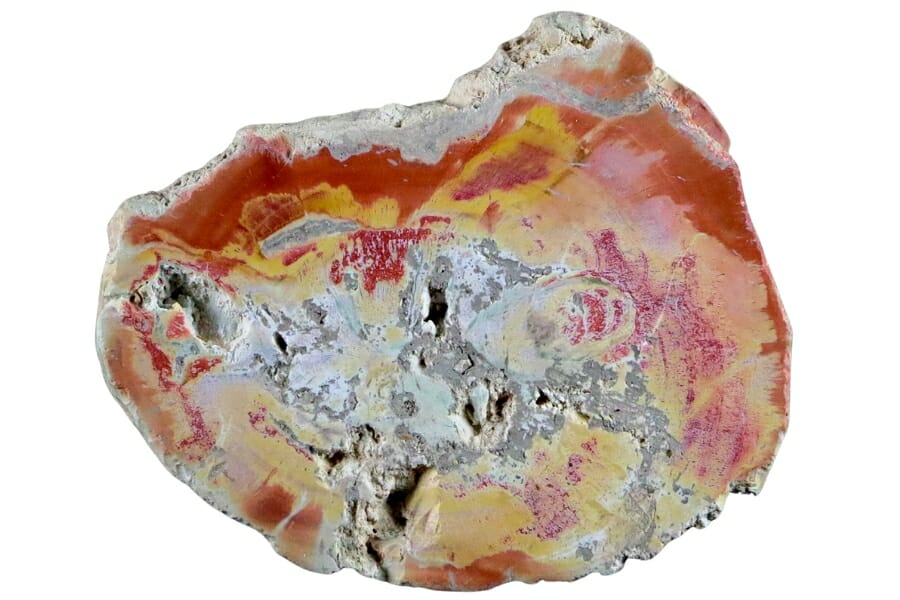Have you ever held a piece of wood that turned into stone? That’s basically what petrified wood is! It’s not just wood anymore— it’s a beautiful rock with colors and patterns that tell a story of a time long, long ago.
Finding petrified wood in North Carolina can be like searching for a needle in a haystack. It’s not that they aren’t there, it’s just that they’re hiding! Without the right guidance, you could walk right past a goldmine of these stones and not know it!
But guess what? We’ve found the legit places where you can find North Carolina petrified wood. We’ll be sharing with you where these are, how you can go there, and what types of petrified wood you’ll find in our state.
Whether you’re an experienced rockhound or just starting out, North Carolina has something special waiting just for you!
What Is North Carolina Petrified Wood
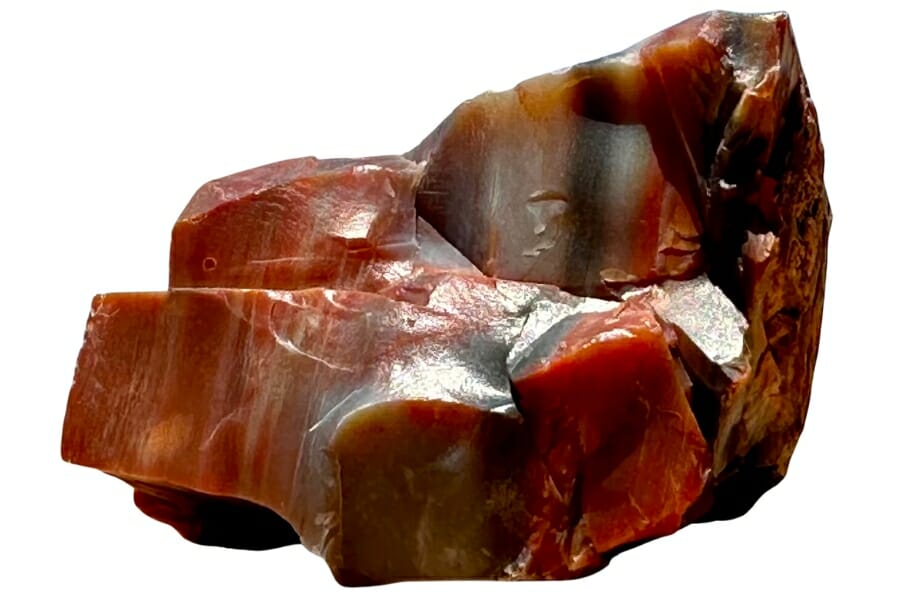
Petrified wood is one of the coolest things you can find in the world of rocks and fossils! Imagine a tree that lived millions of years ago slowly turned into a hard and colorful rock that kept its shape and details.
So, how does this happen? When trees fall and get buried under dirt, ash, or other materials, they get protected from rotting away. Over time, water filled with minerals seeps into it. These minerals start replacing the wood’s cells bit by bit. After millions of years, the entire tree becomes a rock!
Petrified wood is often found where there were once ancient forests and where there’s been a lot of volcanic activity. This is because volcanic ash helps in preserving the trees under it.
And guess what? North Carolina is one of the places where you can find it!
The Types of Petrified Wood Found in North Carolina
If you’re planning on finding petrified wood in North Carolina, it’s important to review your knowledge of what petrified wood is and how you can identify one. It’s also important to get familiar with the different types of petrified wood you can find here, such as:
Silicified Wood
“Silicified” might sound like a big word, but it’s just a way of saying that the wood has been replaced by silica. When you look at silicified wood, it can be really beautiful.
The original wood structure is still there, but it shines and can have a bunch of cool colors like red, yellow, brown, and even blue. This is because as the silica took the place of the wood, it brought along other minerals that add color.
What’s really neat about silicified wood is that you can still see the details of the original wood. This means you can spot things like growth rings, the bark, and sometimes even tiny cells!
Agatized Wood
Agate is a colorful, shiny type of mineral that often forms in layers or bands. So when it replaces the wood’s internal composition, it’s like looking at a rainbow inside a tree!
Agatized wood can have layers of bright colors like blues, reds, yellows, and greens. This is because agate can come in so many different shades.
Another cool thing about agatized wood is how detailed it can be. Even with all those dazzling colors, you can still see things like the tree’s growth rings and the pattern of the bark.
What makes it stand out from other types of petrified wood is its layering of colors. While other types can be colorful, the unique bands and patterns of agate give this wood a special touch.
- The extensive local experience of our team
- Input from a variety of local rockhounds and rockhound groups
- The difficulty in accessing a location
- Safety and potential hazards when collecting
- Private and public locations
- A desire to include locations for both the experienced and newbie hunters who are just starting out
Using these inputs we think we’ve put together the best list out there for those who love finding petrified wood for our collections!
If you want REAL results finding incredible rocks and minerals you need one of these 👇👇👇
Finding the coolest rocks in isn’t luck, it's knowing what to look for. Thousands of your fellow rock hunters are already carrying Rock Chasing field guides. Maybe it's time you joined the community.
Lightweight, mud-proof, and packed with clear photos, it’s become the go-to tool for anyone interested discovering what’s hidden under our red dirt and what they've already found.
Join them, and make your next rockhounding trip actually pay off.
What makes it different:
- 📍 Find and identify 140 incredible crystals, rocks, gemstones, minerals, and geodes across the USA
- 🚙 Field-tested across America's rivers, ranchlands, mountains, and roadcuts
- 📘 Heavy duty laminated pages resist dust, sweat, and water
- 🧠 Zero fluff — just clear visuals and straight-to-the-point info
- ⭐ Rated 4.8★ by real collectors who actually use it in the field
The Best Places To Find Petrified Wood In North Carolina
Endowed with an amazing array of natural treasures, North Carolina has many great rockhounding sites. But if you want to focus your search on petrified wood, you should be aware that not all of these sites have them.
Here are our recommended legit places that you can explore:
Always Confirm Access and Collection Rules!
Before heading out to any of the locations on our list you need to confirm access requirements and collection rules for both public and private locations directly with the location. We haven’t personally verified every location and the access requirements and collection rules often change without notice.
Many of the locations we mention will not allow collecting but are still great places for those who love to find beautiful rocks and minerals in the wild without keeping them. We also can’t guarantee you will find anything in these locations since they are constantly changing.
Always get updated information directly from the source ahead of time to ensure responsible rockhounding. If you want even more current options it’s always a good idea to contact local rock and mineral clubs and groups
Pee Dee River
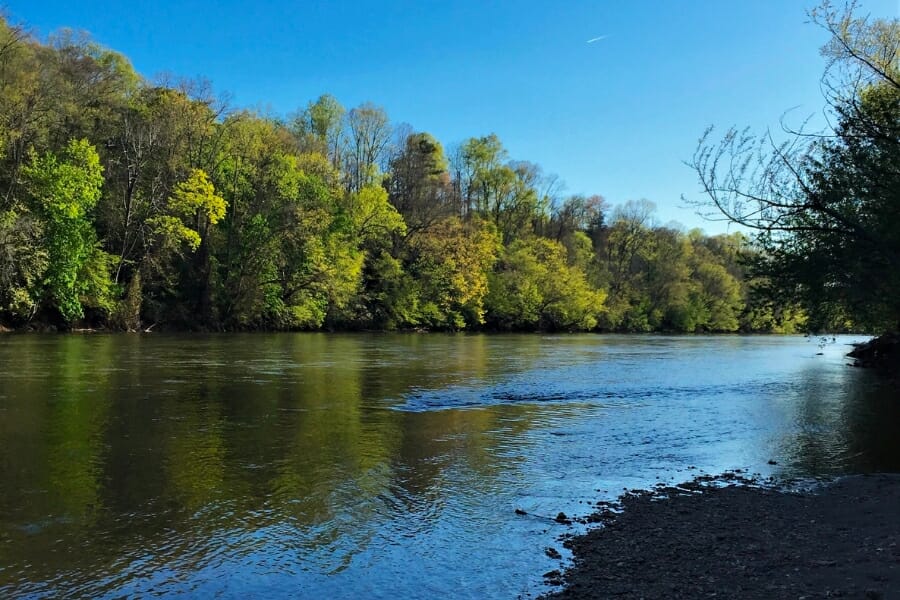
Pee Dee River stretches a long way, starting from the Appalachian Mountains and winding its way down to the coastal plains. Along its journey, it travels through a variety of landscapes, each more beautiful than the last.
It’s mainly found in the southern part of our state, making its way toward South Carolina. It’s surrounded by lush green forests, gentle rolling hills, and sandy banks.
The river has carved its way through layers of rock, some of which are super old. As it flows, it exposes different types of rocks and minerals. You can find petrified wood, shiny minerals, or even gemstones here.
If you want to pay a visit here, it’s pretty easy to get to. Major roads and highways lead to various access points along the river. But before you head out, make sure to review our local collecting guidelines at the North Carolina Department of Environmental Quality (DEQ) website.
Where we found petrified wood in Pee Dee River
You can find agatized wood if you explore the gravels of the Pee Dee River and its tributaries.
Beaverdam Creek
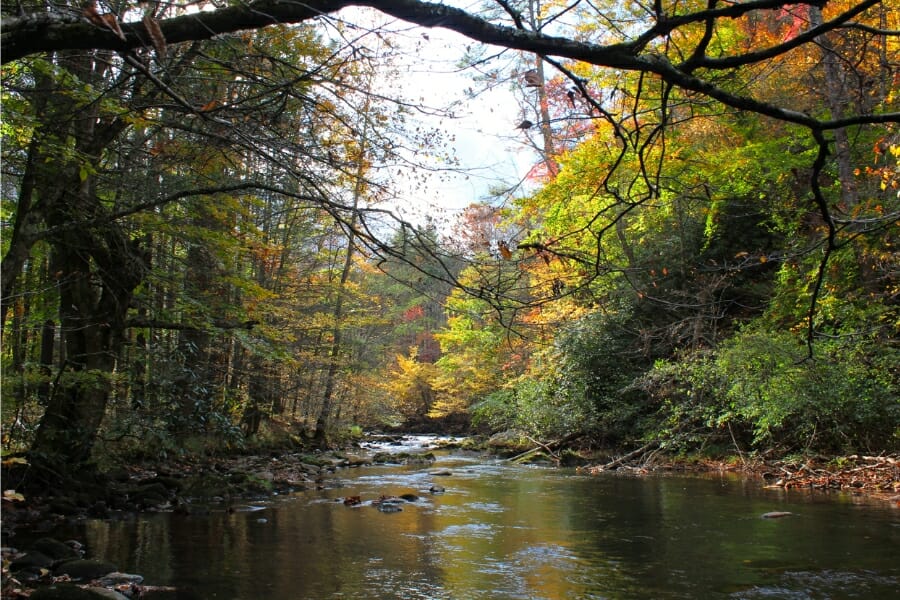
Flowing through the scenic landscapes of the Tar Heel State, Beaverdam Creek offers a glimpse into the beautiful world of nature and geology.
It weaves its way through parts of our state, surrounded by woodlands and open fields. The areas around it are just as diverse, if not more. In some spots, it’s surrounded by dense forests. In other areas, it stretches across open fields.
If you’re wondering about its accessibility, Beaverdam Creek is quite visitor-friendly. The roads leading to it are well-marked, and there are several spots where you can park and start your adventure.
Where we found petrified wood in Beaverdam Creek
We recommend searching through the gravels of Beaverdam Creek to find fascinating samples of petrified wood.
Cumberland County
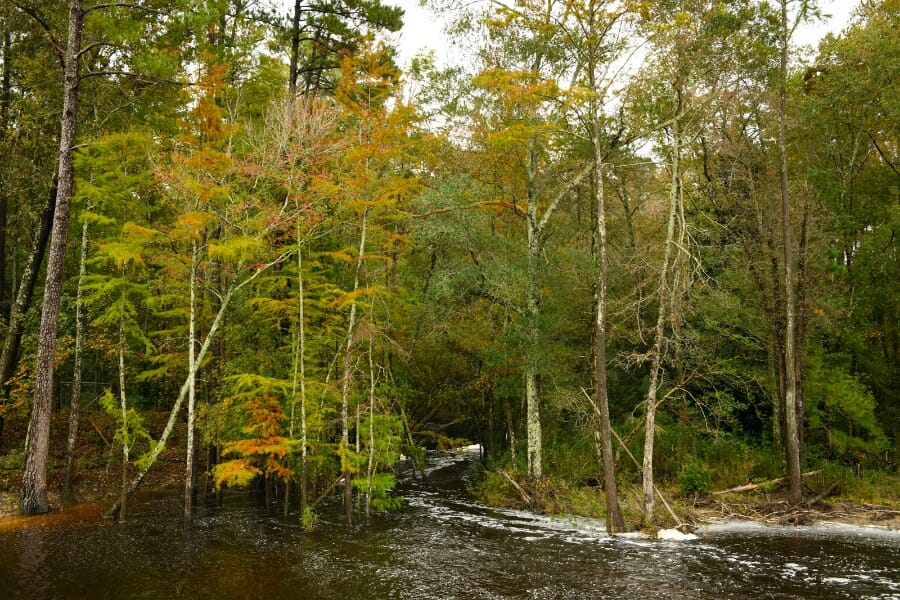
Cumberland County is a spot where geography, terrain, and geology all come together to paint a fascinating picture.
It’s comfortably positioned in our state’s Sandhills region. This means it’s not too far from the coast, but it’s also got some unique features that set it apart from its neighboring counties.
Geologically speaking, Cumberland County is a treat for rockhounds. While the sandy terrain tells tales of ancient seas, the area is also rich in minerals. It’s not uncommon to find different natural wonders here, including petrified wood.
Another great thing about this place is that with major highways running through it, including Interstate 95, it’s easily accessible wherever you’re coming from. Once you’re here, a network of local roads makes it simple to explore it.
Where we found petrified wood in the Cumberland County
You can collect agatized wood countywide in Cumberland, particularly in stream gravels and alluvial deposits, gravel pits, excavations, and road cuts.
Cape Fear River
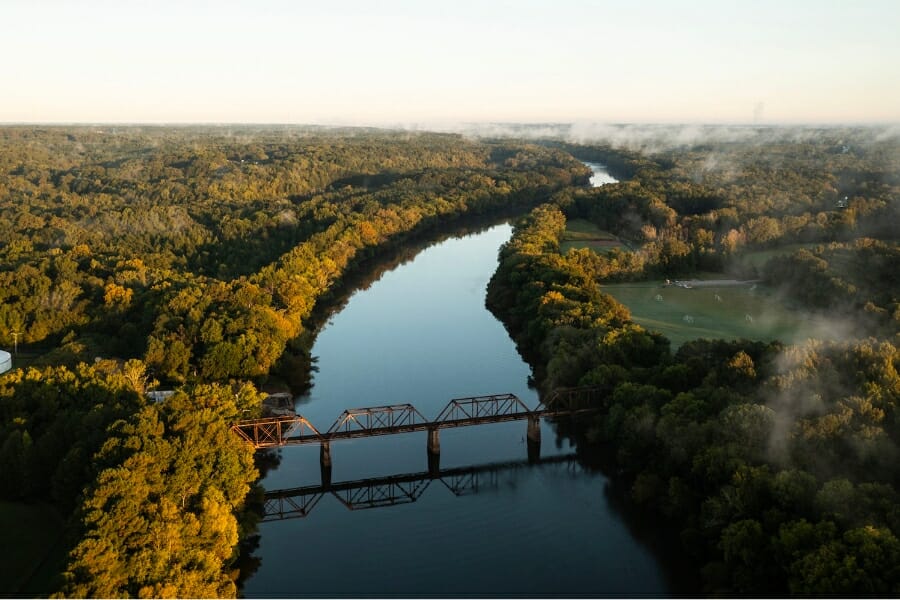
Stretching over 200 miles, Cape Fear River runs from the center of our state all the way to the Atlantic Ocean. It’s one of the longest rivers here and has played a big part in our history and growth.
The river starts in the Piedmont region, where smaller streams come together. Along its path going to the Atlantic, the Cape Fear River passes through varied landscapes— from dense forests to sprawling wetlands.
The terrain around this river is diverse. Upstream, you might encounter rolling hills and valleys, while downstream, it widens and is bordered by marshes and swamps. The river’s banks and bed are also prime spots to find rocks and minerals.
To get here, look for major roads and highways that crisscross the river’s length (it wouldn’t be hard to find because it has plenty of access points).
Where we found petrified wood in Cape Fear River
If you want to find agatized wood, make sure you explore the gravel beds of Cape Fear River and its tributaries.
Eno River
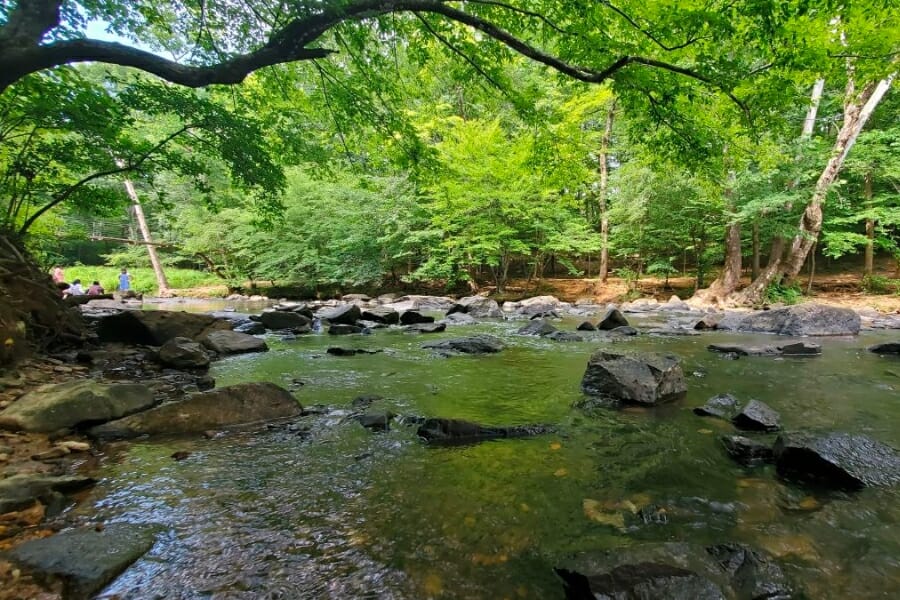
Eno River spans around 33 miles, which is smaller than some. Despite this, it’s packed with wonders and stories.
This river springs to life in Orange County and flows eastward. As it moves, it dances through Durham County before eventually joining the bigger Neuse River.
Around the river, you’ll see gentle hills, thick woods, and even some rocky outcrops. Eno River itself sometimes flows calmly and at other times rushes over rapids, which is very interesting!
Wondering how to get here? It’s a piece of cake! Eno River is well-connected with roads, and there’s even the Eno River State Park which offers easy access. It has trails, camping areas, and informational signs to guide and teach visitors.
Where we found petrified wood in Eno River
To find agatized wood, you can search through the gravels of Eno River.
Other Great Places To Find North Carolina Petrified Wood
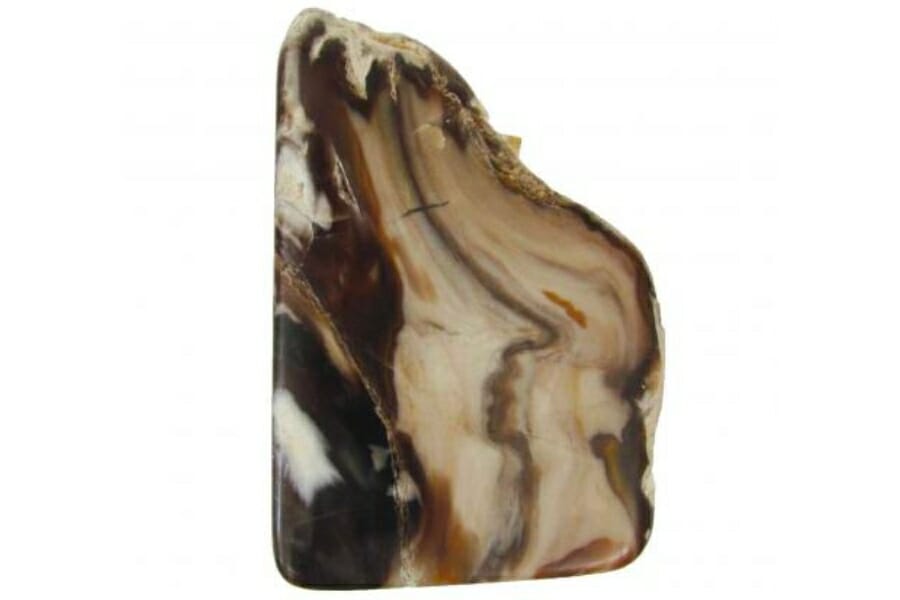
Aside from our top recommendations, there are a few other North Carolina petrified wood-bearing sites that you can consider visiting, such as:
| County | Location |
| Durham | Area fields, cuts, and gravels of Bethesda |
| Durham | Near junction of US 75 and Route 98 in Durham |
| Halifax | All exposures of Quaternary gravels throughout the county |
| Montgomery | Area stream gravels of Troy |
| Orange | Area woods, fields, creek gravels of Chapel Hill |
| Richmond | Area streambeds of Ellberle |
General Areas You Should Try
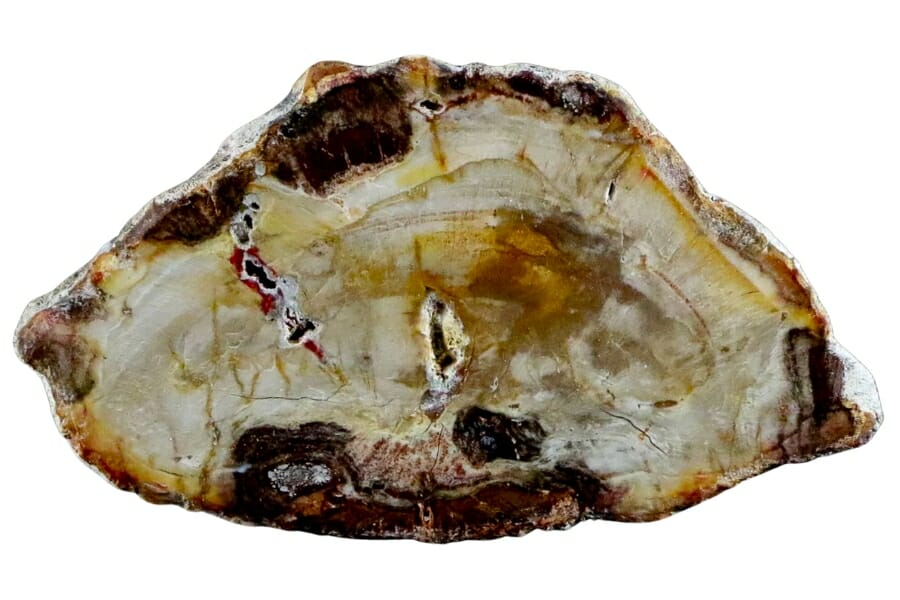
If you want to find petrified wood in rather wide areas, your best chance to find them is to explore the following general spots where they usually hangout:
Rivers and River Banks
Rivers and river banks are legit places to find petrified wood. Its water’s movement digs deep into the earth, pulling up treasures from beneath. When it slows down, especially near the banks, the heavy pieces, like petrified wood, settle down.
That’s why when you stroll along a river bank, you might just stumble upon a piece of ancient, stone-like wood.
Streams and Creeks
Streams and creeks are another great area to find petrified wood. They’re always on the move, even if they’re slow. They scrub away the earth and uncover layers hidden below.
These little waterways, with their twists and turns, are nature’s best excavators. They dig and wash away soil, bringing to light treasures underneath. Heavier pieces like petrified wood get lodged in the slower parts of this movement, like in bends.
Sediment Deposits
Sediment deposits are like nature’s treasure chests waiting to be opened! And they’re awesome spots for finding petrified wood.
North Carolina has lots of places with sediment deposits, thanks to its ancient rivers, lakes, and seas. These areas have seen lots of action over millions of years, burying countless trees in the process.
Common Questions About Finding Petrified Wood In North Carolina
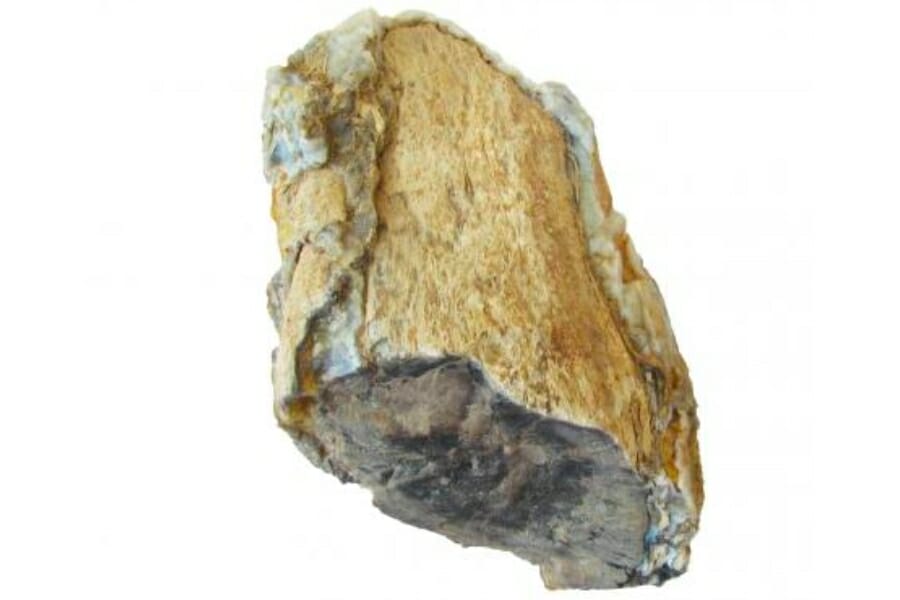
To help you ensure a successful petrified wood hunting experience, we’ll answer some of the most common questions when it comes to finding petrified wood in North Carolina:
How old is Petrified Wood in North Carolina
Most of the petrified wood from North Carolina dates back to the Triassic and Jurassic periods, making it between 230 and 190 million years old!
During these eras, our state had a vastly different landscape filled with expansive forests. As trees fell and were swiftly covered by sediments from nearby rivers, lakes, or even volcanic activity, the conditions were just right for petrification.
Can you find Petrified Palm Wood in North Carolina?
While we have petrified wood in our state, petrified palm is not commonly found here. Our past environments and conditions were more conducive to other types of vegetation rather than palm trees.
If you’re on the hunt specifically for petrified palm, regions with a known history of ancient tropical or subtropical climates might be more promising.
The Best Places To Buy Petrified Wood In North Carolina

Another great way to observe, get your hands on and take home North Carolina petrified wood is by visiting our trusted local shops that sell them. We’ve listed down some of our most recommended stores below:
- Cornerstone Minerals LLC – 52 N Lexington Ave, Asheville, NC 28801
- Enter the Earth – 1 Page Ave #125, Asheville, NC 28801
- Mineralogy – 6910 Fayetteville Rd #109, Durham, NC 27713
- Rocks and Things – 114 Oak Ave, Spruce Pine, NC 28777
- The Fossil Exchange – 7110 Wrightsville Ave Ste B6, Wilmington, NC 28403

